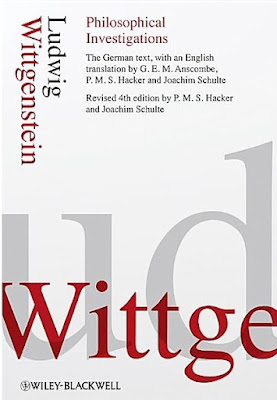昨天備課很費心力,有點卡住了,要轉移注意力,放鬆一下,然後回頭再思考,於是便到臉書寫了以下一段:
【備課透透氣】剛才備課,花了很長時間思考《哲學研究》其中兩三節,還未貫通。維根斯坦這本書的迷人之處,正正在於能迫使(肯用心的)讀者深入思考並試圖得出通透的了解。有些章節這些年來我已讀過多遍,但再讀時依舊自然而然進入「深度思考」的狀態。在我讀過的大哲學家中,只有維根斯坦和尼采對我有這樣的魅力。比起讀一些鑽牛角尖味或學究味重重的分析哲學期刊論文,讀維根斯坦和尼采簡直就像是呼吸格外清新的空氣。
朋友看後留言,這樣問:「其實, 維根斯坦的哲學觀點是否可以寫得清楚明白一點,而不失其深度或魅力?」相信不少讀過維根斯坦著作的人都會問類似的問題,以下我嘗試回答。
跟其他著作(例如文學作品)一樣,哲學著作有形式、內容與風格之分;問題是,三者可以截然劃分嗎?我們大概不會認為文學作品的形式、內容與風格是各自獨立的,例如李商隱七言律詩所寫的,可以改為古文和用韓愈的風格來寫嗎?卡夫卡的小說,如果不是用小說的形式,或不是 "Kafkaesque" 風格,可以表達同樣的內容嗎?
也許有些人認為哲學著作在這方面跟文學作品不同,形式、內容與風格可以各自獨立。我自己不這麼看,例如柏拉圖的對話錄,我不相信可以改為論文形式而保持風格和內容;再如《莊子》的文體和風格,不可以改為《道德經》的文體和風格,而仍然表達同樣的內容。就算是同一個作者,不同的作品的形式、內容與風格都是關連的;尼采的 Thus Spoke Zarathustra 和 On the Genealogy of Morality 不能互換形式與風格,因為這兩本書要表達的內容與尼采採用的形式與風格息息相關。
認為哲學著作的形式、內容與風格可以各自獨立的,很可能大都是受分析哲學訓練的人。分析哲學的訓練講求條理分明的論證,以論說文的形式來表達清晰的內容,不注重個人的文章風格。受過這樣訓練的人,尤其是受過嚴格訓練並且長期實踐的,很可能會覺得風格根本不重要,可以與內容分開;至於內容,雖然通常以論說文的形式來表達,但同樣的內容也可以只列出要點和論證,不必寫成文章。然而,分析哲學不代表所有哲學,即使「哲學著作的形式、內容與風格可以各自獨立」這個看法對分析哲學而言是正確的(或至少是可接受的),卻不一定適用於其他流派的哲學。
Bernard Williams 對這個問題曾經有此評論:
The traditions of the plain style that are familiar in analytic philosophy have much to be said for them, but they can become a dead weight under the influence of the scientific model. One should not approach philosophical writing in the spirit of the analytic philosopher who (in actual fact) said to another when they were trying to write a book together, "Let 's get it right first and you can put the style in afterwards." Why should we assume that it should be like this? When we turn, in particular, to moral and political philosophy, and we look at the canon of past philosophy that even analytic philosophy agrees on, does it look like this? Plato, Hobbes, Hume, Rousseau, indeed John Stuart Mill, not to go into more disputed territory: do we really suppose that their contributions to the subject are independent of the imaginative and expressive powers of their work? (from "What May Philosophy Become?")
他說的主要是風格和內容的關係,沒有談及形式,但我相信他會同意形式也往往難以跟風格與內容截然劃分。
維根斯坦通常被歸入「分析哲學家」這個類別,但其實他著作的形式和風格大異於一般的分析哲學著作。他的寫作自我意識(self-awareness)很強,例如在 Philosophical Investigations 的序言裏便這樣說:"The best that I could write would never be more than philosophical remarks." 對於寫作風格,維根斯坦也表達過一些看法(都收入了 Culture and Value):
Writing in the right style is setting the carriage straight on the rails. (p.39)
My style is like bad musical composition. (p.39)
One's style of writing may be unoriginal in form — like mine — and yet one's words may be well chosen; or, on the other hand, one may have a style that's original in form, one that is freshly grown from deep within oneself. (p.53)
You have to accept the faults in your own style. Almost like the blemishes in your own face. (p.76)
... a man's style is a picture of him. (p.78)
「維根斯坦的哲學觀點是否可以寫得清楚明白一點,而不失其深度或魅力?」這個問題,假如由維根斯坦自己回答,我認為他會說「不可以」。
尼采也是寫作自我意識很強的哲學家,而跟維根斯坦一樣,他認為哲學著作的形式、內容與風格都和哲學家本人密不可分。他在
Daybreak 的序言對他的讀者有一個忠告:"Learn to read me well!" 我們讀維根斯坦時,也應該想像他有同樣的忠告,不責怪他寫得不夠清楚明白,而是
learn to read him well。

王教授可有考慮以維根斯坦及尼采之哲學思想為主題,創作一些短篇小說?
回覆刪除不會喇。
刪除王教授認為卡夫卡之作品可有過譽?
回覆刪除不認為過譽。
刪除何以由
回覆刪除香港移居美加逾50載
有工程博士學位
亦雅好文史藝術
竟會有此知見:
https://www.facebook.com/story.php?id=100006455172220&story_fbid=4605298799695247